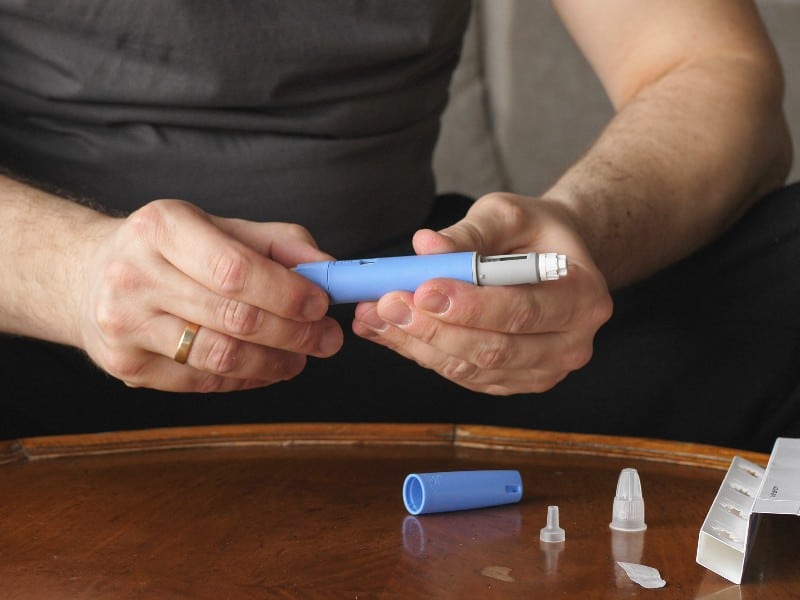A drug that many diabetics count on to regulate their blood sugar is in short supply because it’s become a viral sensation on social media, billed as a way to lose weight fast.
The problem is patients with type II diabetes count on lifesaving GLP1 drugs like Ozempic to lower their A1C blood sugar levels and regulate insulin production, says Nancy Georgekutty, MD, family and obesity medicine specialist on the medical staff at Methodist Mansfield Medical Center.
“Without their medicine, they could be at serious risk of their diabetes becoming out of control, which could lead to major cardiovascular events including heart attack, stroke, or death,” Dr. Georgekutty says.
In addition to regulating blood sugar and insulin production, semaglutides like Ozempic also slow down the digestion process and prolongs feelings of fullness. That’s how they help people lose weight and reduce hunger and food cravings.
But Ozempic, taken weekly as an injectable, has not been approved by the FDA for weight management, and there’s no guarantee that patients using it will keep the weight off once they stop using the medication.
“If users aren’t using it to help get in the habit of prioritizing portion control, they will gain everything back — along with their cravings — once they stop taking it,” Dr. Georgekutty says.

OZEMPIC GOES VIRAL
TikTokers regularly go viral with before-and-after videos showing off how quickly they dropped weight after using Ozempic and other GLP1s, or glucagon-like peptide 1 agonists. The #ozempic hashtag has hundreds of millions of views, and Facebook groups are sprouting up with thousands of devoted followers.
Marketers have added fuel to that fire, filling cable and streaming TV and Instagram with ads promoting the drugs — and not necessarily for managing type 2 diabetes.
As a result, a reliable supply of these drugs has become harder to find because diabetics must compete with a much larger pool of patients. After all, it’s estimated that a third of adult Americans are overweight and 42% are considered obese.
But if that isn’t reason enough to rethink using it as a weight-loss drug, there are other drawbacks:

POSSIBLE SIDE EFFECTS
Ozempic comes with serious potential side effects including inflammation of the pancreas, gallbladder issues, hypoglycemia, kidney problems, serious allergic reactions, and changes in vision.
Dehydration, nausea, and severe vomiting are also common enough that some physicians prescribe anti-nausea medication and laxatives or stool softeners to prevent the worst side effects.
There’s also what some are calling “Ozempic face.” Quickly losing body weight thins your face, causing a more gaunt appearance and potentially accentuating wrinkles. In other words, fat tends to be friendlier to your face than your waistline.
With GLP1 drugs in short supply and with no guarantee that insurance will pay for them, many weight management patients are resorting to online doctors and pharmacies to get them “off-label” — in other words, for an unapproved use. So they may not have a doctor advising them on their use, and that could be risky, Dr. Georgekutty says.
“You could place yourself at serious risk for adverse effects,” she warns. “Then you’ll have to see another doctor to treat your new problems.”

IT’S EXPENSIVE
It’s not cheap to keep up with Kim Kardashian, who is rumored to have used Ozempic to fit into a gown for the Met Gala.
A monthly prescription of Ozempic can cost upwards of $950, or about $250 a dose. And most insurance companies aren’t willing to foot that bill because weight management patients are using it off-label.
Of course, for many people, price is no object for losing weight, especially considering how much they spend obsessively buying healthy food and signing up for fitness classes and gym memberships.
There are half a dozen other medications approved by the FDA for losing weight, some (like phentermine) that tweak your appetite and others (like orlistat) that change how your body absorbs fat. Another semaglutide called Wegovy has also been approved for weight management.

A BETTER OPTION
Dr. Georgekutty says no drug or lose-weight-quick fad can compete with a comprehensive and sustainable approach to losing unwanted weight. That means talking to your doctor about a safe and effective diet and exercise plan.
And that is the emphasis at Methodist Mansfield’s Weight Loss and Wellness Center, which opened last summer.
“Our goal is to provide innovative and compassionate adult weight management and bariatric care,” Dr. Georgekutty says. “We analyze our patients’ psychology, consult their body composition, and provide medical consultations to come up with a lifestyle plan to help them reach their weight-loss goals.”
The idea, she says, is to “take ownership of their wellness journey,” rather than leaving weight loss to a fad that may not have lasting results.
“We partner with patients to develop a plan that empowers them,” Dr. Georgekutty says. “Our approach provides sustainable changes for our patients instead of short-termed seasonal change.”






